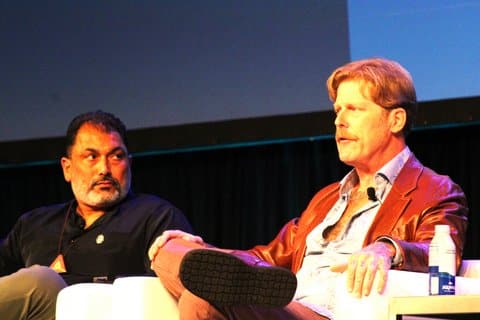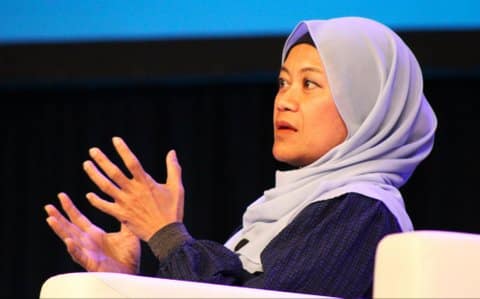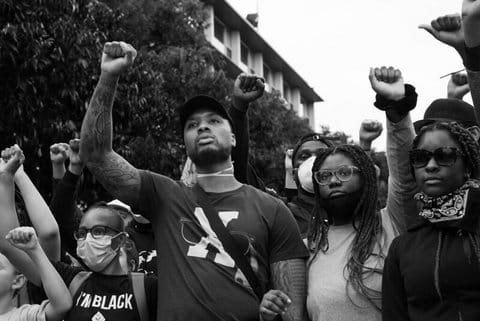
04 Dec Unexpected Friendship Illustrates Power of Personal Connection in Stopping Hate

Pardeep Kaleka, left, and Arno Michaelis speak at the Eradicate Hate Global Summit in Pittsburgh on Sept. 28. The pair formed an unlikely bond based out of hate-fueled tragedy. (Joe Porrello / The CC Pulse)
Editor’s note: The Eradicate Hate Global Summit began in 2021 in response to the mass shooting at the Tree of Life synagogue. This year, The CC Pulse was there for the first time in service of our Stop the Hate coverage. This is one of many stories we will publish that is about or inspired by the summit.
By Joe Porrello
PITTSBURGH — Pardeep Kaleka, whose father was killed by a hate group member, and former extremist Arno Michaelis, who helped found that group, spoke together Sept. 28 at the Eradicate Hate Global Summit.
Michaelis and Kaleka discussed the origins of their relationship and how they use empathy and forgiveness to combat hate.
The pair’s connection stems from one of the deadliest hate crimes in U.S. history; in 2012, white supremacist Wade Michael Page shot 10 people at a Sikh temple in Oak Creek, Wis., killing six before killing himself. A seventh person, who was totally paralyzed after being shot in the head, died of his injuries in 2020.
“This was not just a tragedy for the Oak Creek Sikh community…Sikhs know this worldwide,” said Kaleka. “We were hurt in our most sacred place.”
The victim count reportedly could have been higher if not for Kaleka’s father and temple president Satwant Singh Kaleka, who was killed trying to fight off Page. The gunman belonged to a violent Milwaukee extremist group that Michaelis helped found.
Fast forward a decade — Kaleka was the best man at Michaelis’ wedding, and they co-authored a book and combine to help youth get out of or avoid hate groups.
“Over time, by the 10th year, we had helped thousands and thousands of kids,” said Kaleka.
It all started with talks at high schools, which illustrated to the pair how big of an issue mental health was for the youth that spoke with them.
Part of the work Kaleka and Michaelis do is through initiatives such as Not in Our Town and Parents For Peace.
Not in Our Town is a movement to stop hate, address bullying, and build safe, inclusive communities for all, while Parents for Peace empowers communities to prevent radicalization, violence and extremism.
Michaelis said much of the work Parents For Peace does looks at hate as an addiction.
“I think what’s really important for young people to know: If they feel themselves being attracted to any kind of hate speech or hateful ideologies, just know that hate consumes you; it destroys your life,” Michaelis told the Pulse. “It’s a form of self-harm, and it’s not gonna lead anywhere good. And life without hate in it is just such a beautiful thing.”
The pair’s fight against hate together began about three months after the Sikh massacre in 2012, when Kaleka reached out to Michaelis — who had begun his own work against extremist groups in 2010.
Kaleka said part of his desire to connect with Michaelis came from Sikhs wanting to do something positive with the tragedy they endured instead of having people feel sorry for them.
“We view ourselves with the strength of pride and power,” he said. “But power needs to be reclaimed, and it needs to be less about thoughts and more about action.”
Q&A: Sikh Richmond Man Reflects Seven Years After Brutal Hate Crime Attack
Kaleka was hesitant to take action with Michaelis at first, questioning whether or not racists could really change for the better; his family told him he was out of his mind for even thinking about meeting with Michaelis.
“At this moment, there was a part of me that was wrestling with: This person is a monster. This person is not human. He is a Neanderthal,” Kaleka said. “I’m scared. I’m worried. I don’t know what’s going to happen.”
They ended up meeting at a Thai restaurant in Milwaukee, and Kaleka was immediately relieved. He had recently injured his eye. Michaelis asked about it and cringed with vicarious pain when Kaleka told him the story. The empathy Michaelis displayed made Kaleka feel safe.
“We talked about our fathers. We talked about our daughters. We talked about all of that for three hours, but it all started from a place of empathy,” he said. “Arno raised his hand and said, ‘Going forward, we’re not just doing this work together — we’re brothers.’ ”
Indeed, Kaleka’s children call Michaelis “Uncle Arno” and get upset when people refer to him as a former white supremacist.
Michaelis acknowledged the importance of recognizing people’s pasts but said that labels in the sphere of hate such as “former” and “survivor” often bog down the individual being described.
According to Michaelis, childhood trauma is common among former extremist group members and something he’s dealt with himself.
Although he grew up with loving parents in a nice home that always had food on the table, Michaelis still had his struggles.
His father’s alcoholism made life difficult for his mother, which he resented.
“As I grew up seeing my mother suffering, it hurt me,” said Michaelis.
His inner pain combined with constant praise from people around him telling him as a child how gifted and wonderful he was did not sit well with him.
“As I was suffering, I just kind of said, ‘No, I’m not wonderful; I’m horrible, and if you don’t believe me, watch what I do to this kid on the school bus, watch what I do to this classroom, watch what I do to this society,’” he said. “Hate was just another part of the rush, and that’s when I was exposed to white nationalism.”
Michaelis said that when he became a neo-Nazi, he knew it was wrong.
“I didn’t care as long as I got that rush from offending people and repulsing people,” he said.
Though, eventually it became exhausting for Michaelis to suppress his inner knowledge that what he was doing was not right.
He also became worn out by being cut off from American pop culture, much of which is forbidden by white nationalist ideology.
“I grew up a huge sports, film, music, TV geek,” he said.
In the early 1990s, Michaelis’ then-girlfriend introduced him to “Seinfeld” — a show produced by a Jewish man featuring mainly Jewish characters — after she saw it playing on a TV at the bar she worked at.
He was skeptical to start, but Michaelis ended up liking the show so much that he would tape it every Thursday for him and his girlfriend to watch. They would write “Amber’s second birthday” on the spine of the VHS tape, referring to their daughter, to hide it from Michaelis’ associates.
“Had my guys come over and seen a tape that said ‘Seinfeld,’ there would have been violence,” he said. “I would have been complicit in the destruction of my race by watching a sitcom.”
Michaelis credits “Seinfeld” for helping him see the light.
“The humor of this brilliant sitcom poked all sorts of holes in this very fragile ideology that I was trying to adopt as my identity,” he said. “It finally hit me that if I didn’t change my ways, death or prison is gonna take me from my daughter.”
Michaelis talked about other factors in his exit from neo-Nazism, and both he and Kaleka spoke about ways to help combat hate and violent extremism.
The support of his parents throughout his worst moments made a huge impact in his turnaround, according to Michaelis.
He also pointed to the power of minority co-workers showing him compassion when he least deserved it.
“The most pressing exhaustion stemmed from when people I claimed to hate treated me with kindness,” Michaelis said.
He said some people who have experienced hate in their life are justifiably fed up with trying to be nice, but they must be to make a difference and stop the cycle.
“The fact is that kindness, gratitude, forgiveness — they’re weapons against hate,” Michaelis said, “and when somebody wields those weapons with authenticity, it has the power to force people to question these hateful ideologies that they adhere to; it creates a sense of cognitive dissonance.”
He said that as an extremist it’s tiring to be constantly in fear of those around you, citing Page as an example of someone who felt there was no alternative to suicide because he was terrified of society.
On the 10-year anniversary of the temple shooting, Kaleka’s 16-year-old daughter gave a spoken word, in which she said in regard to Page: “You didn’t hate us; you hated yourself.”
Kaleka pointed out that tolerance and understanding are not always the same for everyone.
“Forgiveness looks different for different people…You’re the guru of your own forgiveness,” he said. “For Sikhs, forgiveness felt like vengeance.”
According to both Michaelis and Kaleka, diagnosing what drives extremism can also lead to solutions.
“We all have a role to play in this, and if a person is going through something in their life and expressing hate speech, we need to see what the feeling is behind it and understand that sometimes feelings get weaponized and they are trying to express something,” Kaleka told the Pulse. “And not to say that’s condoning it… because it’s not; I think we have to call it out but we also have to do something about it to make sure we’re not weaponizing rejection.”
Michaelis called Kaleka’s aforementioned strategy “the gentle-power approach.”
“If we understand the trauma that drives people to see (hateful) ideology as attractive, we’re much better positioned to stop it,” he said.
Michaelis said he used this approach to help Chris Buckley, a veteran who had the “hate of Islam trauma-forged in his soul” after serving in Afghanistan, leave the Ku Klux Klan.
Buckley had a very similar scenario as Kaleka and Michaelis’ relationship with a Kurdish Muslim man named Dr. Heval Kelli; the pair are the subject of a documentary called “Refuge.”
Nowadays, Buckley works full-time getting people out of hate groups and is a senior colleague of Michaelis.
Kaleka said many people get caught up in his and Michaelis’ friendship being strange, but he does not think it should be seen that way.
“We want to make it more normal,” he said.
Michaelis echoed his sentiment.
“We need to normalize that we are all human beings,” he said. “We have so much more in common than different, and at the same time, every single one of us is a unique individual with divinity within us, so we have to kind of navigate that dichotomy.”
Challenging ourselves to get out of our comfort zones and finding common ground, according to Michaelis, will eradicate hate.
“Pardeep has taught me by example and through leadership: It’s easy for us humans to feel kinship with people who look like us, who pray like us, who eat like us, especially who think like us,” he said.
The youth give Michaelis optimism.
“I think we’re headed in a great direction despite all of the polarization and conflict we have in our society today,” he told the Pulse. “There’s a lot of things that really indicate as humanity, we’re better off today than at any point in human history, and I think it’s important to be mindful of that and to keep trying to guide the future in a healthy direction.”
Any victim of or witness to a hate incident or crime in California can report it and receive support any time at CAvsHate.org. You can also call 833-8-NO-HATE; (833) 866-4283 Monday – Friday from 9:00 am – 6:00 pm. If outside of those hours, you can leave a voicemail, or you can call 211 to report hate and seek support. You can currently submit reports online in 15 languages and, when calling the hotline, you can get access to support in over 200 languages. If you want to report a hate crime to law enforcement immediately or you are in present danger, please call 911.
This resource is supported in whole or in part by funding provided by the State of California, administered by the California State Library in partnership with the California Department of Social Services and the California Commission on Asian and Pacific Islander American Affairs as part of the Stop the Hate program. To report a hate incident or hate crime and get support, go to CA vs Hate.





No Comments